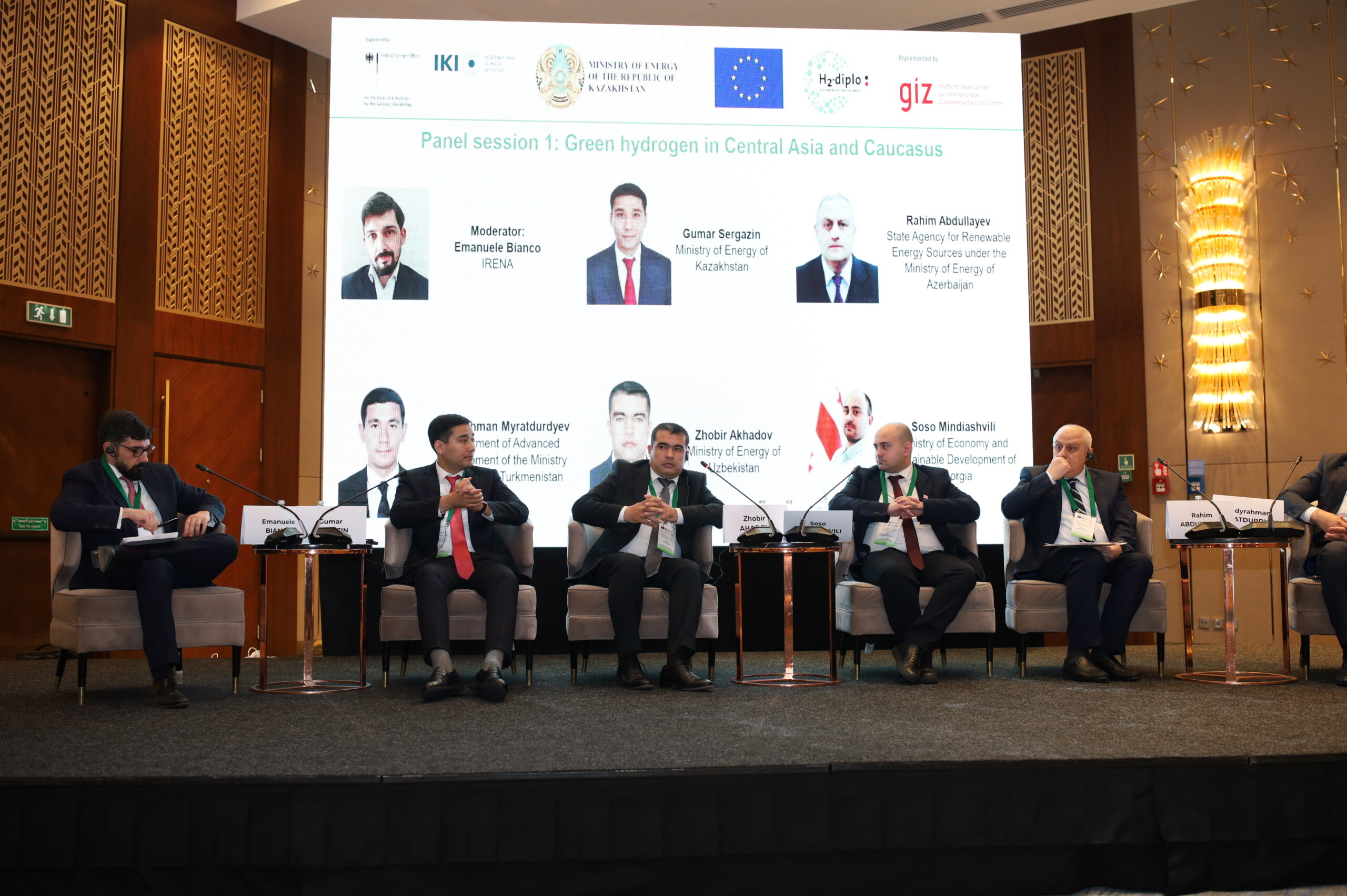ASTANA – The Central Asian hydrogen development potential along with pilot projects was explored at the Central Asian and European Hydrogen Diplomacy Forum on May 23 in Astana.

From left to right: Emanuele Bianco, panel moderator and program officer at IRENA, accompanied by representatives of Energy Ministries: Gumar Sergazin from Kazakhstan, Zhobir Akhadov from Uzbekistan, Soso Mindiashvili from Georgia, and Rahim Abdullayev from Azerbaijan. Photo credit: Hydrogen Diplomacy Forum press service.
The forum was organized by the Hydrogen Diplomacy Office Astana, serving as an international exchange platform between Kazakhstan and Germany on green hydrogen in cooperation with the European Union’s Sustainable Energy Connectivity in Central Asia (SECCA) project.
Kazakhstan’s green hydrogen prospects
Kazakh Energy Ministry’s Director of the Department of Atomic Energy and Industry Gumar Sergazin, briefed the forum participants on Kazakhstan’s outlook for the development of green hydrogen.
“Kazakhstan has unique natural resources as well as the vast potential for the development of hydrogen energy. This step is in line not only with the internal needs of the country but also with the global challenges of the world, such as climate change and the move towards renewables,” he said.
One of the primary reasons for developing hydrogen production in Kazakhstan is the country’s commitment to reducing greenhouse gas emissions, according to Sergazin. As a signatory to the Paris Agreement, Kazakhstan has integrated this initiative into its broader strategy to achieve carbon neutrality by 2060.
“Secondly, the development of hydrogen energy promotes energy source diversification. It reduces dependency on fossil fuels. We have a lot of coal resources and this can also improve the energy safety of the country,” said Sergazin.
“Third, hydrogen energy opens up new economic and investment possibilities in this area, it creates new jobs and stimulates innovation and economic growth. Kazakhstan can become a leading player in the global market of green energy by exporting hydrogen and hydrogen-related technologies,” he added.
The ministry is already working on pilot projects that include development of electrolysis units using renewable energy sources, hydrogen transport vehicles, as well as hydrogen storage systems.
Central Asia and the Caucasus
Zhobir Akhadov, deputy director of the National Scientific Research Institute of Renewable Energy Sources under the Uzbek Ministry of Energy, shared details about the institute’s work on hydrogen development projects.
“Our institute has created several laboratories, such as a certification laboratory, scientific laboratory. The largest one of those is the hydrogen-related laboratories and these laboratories create new types of electrolyzers. The work is also taking place on getting catalyzers. We also work to use hydrogen for vehicles,” he said.
“For the first time in our country, we received the certificate for the photovoltaic module testing and the work is on its way to expand the capacity of our laboratory not only to test photovoltaic modules but also to test other parts of solar power plants, wind power plants. We also have cutting-edge equipment, and we work on testing the different modules of vehicles and transmission networks. We work on integration of different types of technologies, on connecting this type of technologies to the grid,” he added.
Azerbaijan was represented by Rahim Abdullayev, a consultant of the Hydrogen and Green Technologies Department of the State Agency for Renewable Energy Sources under the Ministry of Energy of Azerbaijan.
He highlighted the vast potential of wind energy in Azerbaijan that can be utilized to produce green hydrogen.
“We have several scenarios of offshore wind energy development: first, with the basic capacity of 1.5 gigawatt wind installations, we can satisfy 7% of Azerbaijan’s electricity demand by 2040. And with the high growth scenario of seven gigawatts of fixed wind power capacity, we can satisfy 37% of electricity demand by the same year,” he said.
According to him, the natural gas reserves in Azerbaijan also create an opportunity for the development of blue hydrogen projects.
“It is possible to use our country’s existing experience in ammonia and methanol production to develop the green hydrogen industry. Green hydrogen can also help decarbonize Azerbaijan’s petrochemical industry,” said Abdullayev highlighting the possible hydrogen intergration scenarious in domestic consumption.
They are also considering the potential for export. In Azerbaijan, it is possible to export hydrogen by blending it with natural gas through the Southern Gas Corridor (SGC).
Soso Mindiashvili, senior specialist at the Ministry of Economy and Sustainable Development of Georgia, informed the forum participants that their ministry has signed a memorandum of understanding in cooperation with the Georgian Oil and Gas Corporation, Batumi Municipality Hall and the German Reconstruction Credit Bank (KfW). The purpose of the agreement is to work together on the development of the green hydrogen pilot project worth 1.3 million euro (US$1.4 million) and its full value chain.
“Georgia will take a leading role in the development of a regional green hydrogen economy, by capitalising on its strategic location and the existing industrial experience related to hydrogen derivatives. The significant hydropower potential and reasonable wind and solar potential of the country can be utilised for hydrogen production, exploiting the seasonal variability of hydro and the flexibility that can be offered to the power system by electrolysers,” he said.

